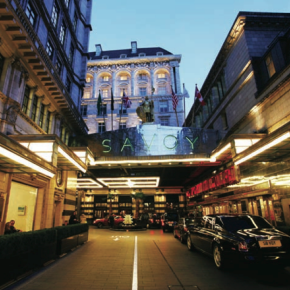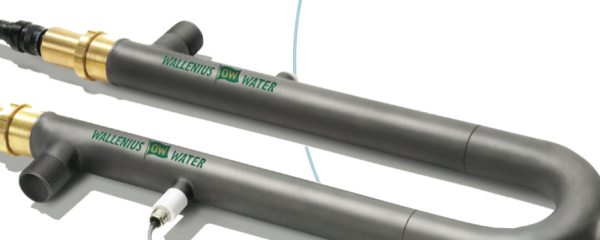
Water treatment in hotels and leisure facilities
Legionella can pose a deadly risk in any water system. In hotel and leisure facilities where swimming pools, spa baths and Jacuzzis are often found, extra care must be taken.
Good design and fit-for- purpose maintenance are essential. Steven Booth, associate director for Guardian Water Treatment, explains how careful consideration of these factors can result in safer water while using less chemicals – key for sites looking to reduce the smell and irritation caused by chlorine – in the latest issue of ABC+D magazine.
The first identified outbreak of Legionnaires’ disease was traced back to a Philadelphia Hotel in 1976 during the American Legion Convention, which eventually resulted in 130 hospitalisations and 25 fatalities. Over 40 years later, hotel and leisure buildings remain some of the most at risk sites when it comes to harmful bacteria growth, often housing swimming pools, spas and Jacuzzis, providing the warm and stagnant conditions that encourage Legionella growth.
Other high risk facilities include showers and misting devices – particularly effective at spreading harmful droplets of the bacteria. When installing water systems, price is, of course, a valid consideration for specifiers and building owners. However, value engineering choices are often a false economy, leading to increased costs over time. Another issue we regularly come across when treating problem water systems is the overuse of chemicals.
While it may be tempting to simply up the dosage of substances such as chlorine, this is not always an effective solution and can seriously impinge on the customer experience. By laying down the groundwork at the specification and construction stage and choosing a bespoke and monitored approach to ongoing maintenance, the customer experience is improved and safety ensured.

Steven Booth, Guardian Water Treatment, “a bespoke approach to water hygiene should be take from the outset.”
Chlorine overload
Chlorine, one of the most commonly used chemicals for water disinfection, is the subject of many complaints amongst hotel customers, with its distinctive smell and potential to cause allergic reactions such as eye reddening and skin irritation. The over-chlorination of swimming and spa facilities is a misguided solution to water system maintenance when a simple adjustment to the backwash or filter settings is often more effective.
Excessive dosing is also avoided by tailoring amounts to a specific system and its usage. Through continuous monitoring, issues are flagged-up quickly and the root cause dealt with, rather than masking a problem.
Non-chemical alternatives, such a photocatalytic water purifiers, can be installed at the construction stage or retrospectively providing an extremely effective solution that continually purifies the water. Inspired by nature, a specific frequency of light and photocatalytic surfaces are used to create free radicals that break down harmful micro-organisms and other pollutants.
With less dosing, also comes less maintenance work, while reducing water wastage as the frequency of flushing is dramatically reduced. Plus, with chlorine usage potentially cut by up to two-thirds, relaxation areas will smell less chemically and organic odours are prevented, creating a pleasant atmosphere for guests to unwind.
Chemical overload is not the only repeat offender; we see a wide range of common issues that exacerbate poor water hygiene across all water systems in a building:
Low flow fittings:
Modern plumbing trends such as these can create the ideal conditions for Legionella growth by allowing water to stagnate. Low flow fittings definitely have a place in leisure facilities, however, helping to reduce the large volumes of water required. These systems should not be overlooked, therefore, but careful maintenance and regular cleaning and testing should be a top priority.
Lack of understanding:
If a treatment system is incorrectly used its effectiveness will be compromised. We see many examples of supplementary equipment that ends up failing or being turned off all together due to a lack of understanding in terms of required Planned Preventative Maintenance (PPM) regimes. Training and awareness is key.
Don’t fit and forget:
Magnetic water conditioners and other fit-and-forget ongoing maintenance solutions are a popular choice at construction stage due to their low energy and maintenance credentials. In practice, however, we have found they produce varied results when compared to traditional salt-based water softeners, with problems such as limescale formation presenting themselves after commissioning.
A bespoke approach to water hygiene should be taken from the outset, based on a specific building and its use. Careful planning in the early stages can result in a more efficient, sustainable and cost-effective building with reduced maintenance requirements.
From design to commissioning and beyond, water hygiene should be given full consideration, making for a smooth handover to building managers and, more importantly, ensuring the long-term safety and comfort of its occupants.
Latest news

18th December 2024
BMBI: October Merchant sales rally with a +7.3% month-on-month increase
The latest Builders Merchant Building Index (BMBI) report shows builders’ merchants’ value sales in October were up +1.2% compared to the same month last year.
Posted in Articles, Bathrooms & Toilets, Bricks & Blocks, Building Associations & Institutes, Building Industry News, Building Products & Structures, Building Services, Building Systems, Civil Engineering, Cladding, Concrete, Cement, Admixtures, Drainage, Drainage Services, Floors, Garden, Hand Tools, Hard Landscaping & Walkways, Health & Safety, Heating Systems, Controls and Management, Heating, Ventilation and Air Conditioning - HVAC, Information Technology, Interior Design & Construction, Interiors, Landscaping, news, Paints, Paints, Coatings & Finishes, Pipes, Pipes & Fittings, Plant, Equipment and Hire, Plumbing, Power Tools, Publications, Research & Materials Testing, Restoration & Refurbishment, Retrofit & Renovation, Site Preparation, Sustainability & Energy Efficiency, Timber Buildings and Timber Products, Walls, Waste Management & Recycling
18th December 2024
GEZE UK announce Kids' Village charity partnership
Kids’ Village is delighted to have partnered with GEZE UK as their 2025 charity of the year – find out more via the article…
Posted in Access Control & Door Entry Systems, Architectural Ironmongery, Articles, Building Industry Events, Building Industry News, Building Products & Structures, Building Services, Charity work, Doors, Facility Management & Building Services, Health & Safety, Restoration & Refurbishment, Retrofit & Renovation, Security and Fire Protection, Windows
18th December 2024
Encon Achieves 5% Club Silver Membership
The Encon Group, the leading independent distributor of building materials, is pleased to announce that it has been awarded Silver membership of The 5% Club by the 2024/25 Employer Audit Scheme.
Posted in Articles, Awards, Bricks & Blocks, Building Associations & Institutes, Building Industry Events, Building Industry News, Building Products & Structures, Building Regulations & Accreditations, Building Services, Building Systems, Civil Engineering, Cladding, Concrete, Cement, Admixtures, Facades, Hard Landscaping & Walkways, Health & Safety, Insulation, Landscaping, Plant, Equipment and Hire, Recruitment, Restoration & Refurbishment, Retrofit & Renovation, Site Preparation, Training, Walls
18th December 2024
SWA: A focus on Steel Window Association member West Leigh
Located in Charlton, South London, SWA member West Leigh was established during the Blitz, in 1943. During the destruction in London, the company helped in repairing windows and facades that had been damaged by bombings throughout the city.
Posted in Articles, Building Associations & Institutes, Building Industry News, Building Products & Structures, Building Services, Building Systems, Case Studies, Facades, Glass, Glazing, Restoration & Refurbishment, Retrofit & Renovation, Steel and Structural Frames, Walls, Windows
 Sign up:
Sign up: 